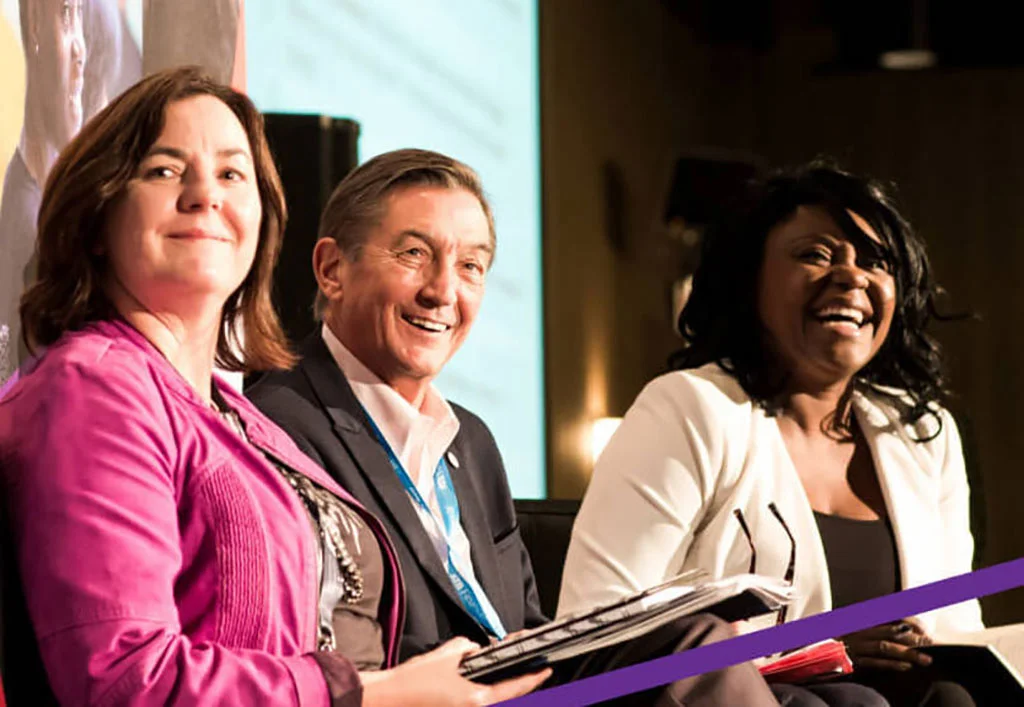David LePage On Recreating Relationships To Transform Communities With Mission-Driven Social Entrepreneurship
David LePage is co-founder, Director and Managing Partner of Buy Social Canada. Buy Social Canada facilitates social purchasing relationships and offers a certification program for social enterprise suppliers and purchasers.
David is Executive Director of Community Impact Real Estate, CIRE, a social enterprise in Vancouver’s Downtown Eastside using a portfolio of over 100,000 sq. ft. of commercial property to create social and economic value for low income residents.
He is a founding partner of the Social Enterprise Institute, SEI. SEI is an accessible on-line learning, coaching and resources platform for social enterprises and social entrepreneurs.
David is a Principal with Accelerating Social Impact CCC, Ltd., one of Canada’s first ever hybrid social enterprise corporations. Through ASI he provides social value-based business advice and consulting, promotes a supportive public policy environment and advises social purchasers and impact investors. His years of experience cross all dimensions of social enterprise activity, in rural and urban settings, across cultures, and internationally.
David is the Chair of the Social Enterprise Council of Canada and Chair of the Social Enterprise World Forum Board.
He is a Program Adjunct and an Instructor for the University of Fredericktown Sandermoen School of Business MBA in Social Enterprise Leadership.
David is a member of the Canadian CED Network Policy Council, a Board member of the Vancouver Farmer’s Market, Ethelo Decisions and Ethelo Democracy. David was the Manager of Enterprising Non-Profits from 2006 to 2013.
David discusses how business models may contribute to and not just extract value from communities, he talks about the shift in the social enterprise sector and shares important traits of successful social entrepreneurs (and how they commonly fail) in the lead up to this year's Social Enterprise World Forum.
Highlights from the interview (listen to the podcast for full details)
[Tom Allen] - As one of the pioneers of the social enterprise sector, could you please share a bit about your background and what led you to working in this space? [3:16]
[David LePage] - It's interesting when you say, "pioneers." I used to tell stories in years, and now I've been told I have to start using decades. It's interesting because I originally got involved in social enterprise... We didn't have that term, but what we were doing is, years ago in the early '70s we were doing community organising in inner-city communities in the US is where I was working. As another tool to empower communities, we realised we had to own our businesses or use businesses as an effective tool. We didn't do it for the profit. We did it because we needed a print shop, or we wanted to keep a restaurant from closing in the neighbourhood, or we needed to improve housing.
We came at it from really a community organising social value kind of perspective. So we had to figure out, 'how do you do this? How do you learn how to use businesses?' Because it was a really important fabric in the community, so we had to learn that this was part of what we had to do. It really came from...
how do you make sure that some of the services and some of the issues that can only be delivered through a business model are done in a way that contributes to community and doesn't just extract value from community?
As the CEO at Buy Social Canada, which is an intermediary organisation that advances social procurement, can you please share how you've seen this sector shift in Canada or globally, and the most common challenges you see when bringing purchasers and suppliers together? [5:04]
I think what we have to realise, is that the marketplace has been around for a really long time.
People trading goods and services has been going on for thousands of years. Somehow in the past 400 or 500 years, that relationship between suppliers and purchasers went from something of creating mutual value to someone actually creating personal or private or economic benefit.
When we started to talk about social purchasing as a way to enhance the capacity of social enterprises, the first reaction from buyers was, "Is this some kind of socialist plot to overthrow capitalism?" We couldn't say that. So we said, "No, no. It's really about putting a social value into the marketplace."
I think the biggest shift, Tom, has really been not so much the transaction, the transaction still happens, but now we're actually shifting the culture or the outcomes of those relationships from just being an economic relationship to being a community value outcome.
That's not so much a technical thing as it is a cultural and a value-based model. So I think the big shift I've seen is people are starting to understand, yes, we're buying good and services. We're competing on price and quality. We learned 20 years ago and we're still learning how to add an environmental value, and there's a social value in this relationship. This relationship is not just a transactional relationship. It's actually a transformation piece. It's a cultural relationship.
So bringing together buyers and suppliers or social enterprises and the traditional buyers, it's really recreating relationships.
It's a really nice way to frame it. What advice, then, through your such diverse experience, David, would you give social enterprises who are looking to build their revenue streams and engage with government or corporate buyers to further this common relationship in bettering the community or the space around them? [7:29]
I think we have to realise that most purchasers have been trained around getting the best quality product at an effective price and these other things are new to them. So we really have to be conscious of where they're coming from, and we really have to be conscious of working and competing in the big marketplace, so social enterprises have to be able to compete on product and service quality, efficiency, pricing, and have to be able to demonstrate their social value.
Where we see the success is when we have a social enterprise be really clear about, "Here's what I deliver, here's the quality, here's the pricing, and here's the social value that comes with it."
We're seeing that, as that's the model for everyone to succeed, because the buyer feels really good about the fact that they got what they needed at a competitive price plus they contributed to the community. The social enterprise can say, "Oh, I got a new customer." This is a part that's important, Tom, every new customer is greater social value.
Do you see struggles sometimes in these organisations being able to communicate that effectively? [9:10]
Well, I think what part of is we're still at a story, anecdotal stage, so even the limited research we have when you look at the great work that's been done like with 'Ready for Business' in Scotland. It's really that learning to bring people together and recreate relationships because evidence is one thing, but we know that a lot of purchasing, especially government and corporate, is really about the relationship.
I think what we're doing is, we can create the research and show some outcomes, but it's when they start interacting between products and services, and the buyer starts to say, "Wow, I got what I wanted, what I needed at a good price, and I helped a community create 20 jobs for people with barriers." Then we start to click.
That's what we were talking about a few minutes ago. That's the cultural shift. It's not just an evidence-based model.
Certainly. You just brought in government there too, David, and you've played a very large role in helping develop policy. You're also the chair of the Social Enterprise Council of Canada. From your perspective, what should governments be doing to support the social enterprise sector, and what tangible results has the Canadian government seen by engaging with this sector? [10:21]
I think there's some important components.
Over 10 years ago, we started to approach the development of social enterprise in Canada from an ecosystem perspective and basically said, "You've got to have business acumen. You have to have access to the right capital. You have to have access to markets. You have to have the right policy framework. You have to have networks."
So it allowed us to create a framework to influence government policy, at the municipal level we have provinces, provincial level and the federal level, not by trying to say, "Do everything at once," but to build over years an ecosystem, so you are seeing the right context at the right time. Because I think where some governments have been much more focused on, "Well, we can help build capacity", or some other governments, "we can move on social procurement,".
So having that ecosystem perspective, I think, has really benefitted our ability to influence it.
We now look at that framework and we see it reflected in just last week Newfoundland and Labrador passed a social enterprise strategy based on that same framework. Nova Scotia's based on that. Ontario has used a lot of it, Manitoba. Now working with the federal government, we're just finishing up a major policy recommendation, co-creating with the federal government a social innovation, social finance strategy. Again, it has those same components. I think the big thing we learned is really an ecosystem approach and co-creation. Still some big gaps, of course. I think the biggest gap in Canada is we're still struggling with getting a social finance spectrum that's really complete. Not just one that offers market returns, but one that actually works more with a community-based model. It's moving, but there's still a lot to do.
It certainly sounds like a lot of progress has been made, which is really positive. As chair, then, of the Social Enterprise World Forum, which this year will be held in Edinburgh, what are you most looking forward to about the forum, and what can participants expect if they're to go? We're very happy to say that we'll be there, and we're looking to meeting a lot of you there. [13:00]
It's great because we had the first Social Enterprise World Forum in Edinburgh, so it's great to come back 10 years later and to see the shift in the conversation, because then, it was a few hundred people talking about what it is, and what are we doing, and just, 'what is this thing called social enterprise?' So lots of exploring of some basic concepts and building some relationships. Now 10 years later, you see the strength that comes from different... Every country has just matured so significantly when you look at what's going on in New Zealand, Australia, Taiwan, Korea, to say nothing about what you've done in Scotland and Britain.
I think the big shift, is now it's no longer about just what is and why are we doing this? But how do we work together to show the impact and to demonstrate the impact and to shift the public policy arena.
I think WITH the Social Enterprise World Forum, the greatest benefit has been the ability to move from country to country from continent to continent and the legacy impacts.
I mean, I think of Canada. It was in 2013 when we hosted the Social Enterprise World Forum. To get a federal minister to stand up in the front of the global community and say, "We support social enterprise," was a significant legacy. We see the development that's happened.
It certainly sounds like a lot of progress has been made, which is really positive. As chair, then, of the Social Enterprise World Forum, which this year will be held in Edinburgh, what are you most looking forward to about the forum, and what can participants expect if they're to go? We're very happy to say that we'll be there, and we're looking to meeting a lot of you there. [13:00 - continued.]
I think the greatest thing this year at the Social Enterprise World Forum, is to really experience that collaborative environment that we've created, that reflects why we do social enterprise. It's really about building communities, and we've built relationships.
We continue to do that.
I think there's a pragmatic side, but there's also this real reflection of, 'this is a new way of doing business.' This is not about business to extract. This is about business to contribute to community. Now we see that growing every year.
It'll certainly be a really exciting environment to be a part of. Thanks for the work that you're putting in to making that a reality. Touching on social entrepreneurship from more of an individual touchpoint, what do you believe are the fundamental ingredients, then, of successful social entrepreneurs? [15:35]
I think sometimes it's that they have a really great business model, but I think more than that, it's really about understanding that this isn't just the product or the service.
This really has to be mission-driven, and social entrepreneurs that are successful, really are driven by that mission, that purpose to make some kind of significant change or some kind of impact in terms of the social value. What happens, then, is because they're so driven by mission that the values of things like persistence and focus have to be there.
Because even if you have the great business model and you try to tell someone, "We're doing this business model to change the world," they look at you like, "Come on. What's the product? What does it cost? You say, "No. What's really important here is the social impact." That takes persistence and it takes focus because we've seen social entrepreneurs start out with that, but then shift because the investor says they want this or, "Well, we've got to get a market return on our investment so let's focus it this way."
I think the ones that have been really successful are those that stay focused, are persistent, and understand that it's really the mission driving this.
It's the product and services, great, but it's like, "What's the social value we're creating here?"
I think there's some really good insights there. You've spoken a little bit about mission drift there. What would be one of the most common reasons that you see social enterprises fail then? [17:33]
This is where it flips, Tom.
The successful ones are the mission-driven, but I think some of the failures actually come from poor business skills because they think the whole thing can survive on mission.
If you're, let's say, in the construction business or the home repair business, you've got to do a really good job. If you're in the food and catering service, you've got to do excellent food at a competitive price, regardless of the mission.
On the one side we have to be really mission-driven, but if we don't blend that with really good leadership and good business skills, we're just not going to be to successful.
I think the success side and the failure side is at capacity to blend a focus on social outcomes or social value, but to make that and to deliver that in a such a great business package that people want your product or service which creates the social value.
What inspiring projects or initiatives, then, have you come across recently? I'm sure you've come across hundreds which are creating this positive social change and which are effectively using good business to create positive social change... [18:54]
I think there's some real interesting things that have been successful. We start to see social enterprise working in traditional business areas so we see EMBERS in the downtown Eastside, which is one of Canada's poorest postal codes, running a social value day labourer company working primarily in construction. By creating a social value-driven business model, filling a great market need, but really enhancing and creating. I mean, a typical day, they'll have 300 people out in the field working, which I think is a significant impact, because they're working primarily with people with some barrier to employment, but they're doing it in a really supportive way.
I think we're seeing more success with some of the aboriginal-driven social enterprises, recognising that culturally a social value business is really effective in aboriginal communities. I think we're seeing much more leadership from, and recognising that for a lot of social enterprise, it has really been driven by the leadership of women, and some of us like myself need to learn to step back a bit, and recognise that and let that leadership come forward.
I think the biggest step we're seeing is that social enterprise is starting to change in that. It's responding to market needs as opposed to just a social need. So rather than saying, "Oh, I need to create some jobs for these people," or "We do this as a social value," they're starting to look at, "Okay, where's the business opportunity that I can take advantage of in order to achieve my mission?"
So we're seeing a lot of activity across Canada in the construction sector, like the fringes of the construction sector, subcontracting, etc. because there's a huge market need. It's interesting that the model shifting from being driven by, "I have a social need," to "Is there a market opportunity?"
Very interesting. David, you've seen a lot of change over many years in this sector. Looking forward then, in 10 years time, where would you like to see the sector sitting, and what sort of changes would you like to see within business? [21:25]
I think the progression we need to see, Tom, is to continually look at that as this evolution of the relationships in the marketplace, so social enterprise is actually seen as a significant part and an important part of the supply chain for government and private sector; because we know that every purchase has an economic and environmental and social impact. It has those ripples. Right now oftentimes we just let the ripple happen. It's very unintentional.
I think if in 10 years we're much more conscious of intentionally creating the economic and the social ripples we want, then I think we made some progress.
But that progress means a shift, as we've talked about, in relationships, a shift in some public policy that encourages it. So we see people getting rewarded with tax incentives or financing or whatever, that creates not just an economic value but that actually creates an economic and a social value. I think if we can get more of that movement like where the private sector starts to understand this isn't about quarterly dividends, this is about long-term engagement and transformation of communities. That's, I think, why social enterprise started, how it's emerged, and I think our success will be measured. Can we continue to move that dial?
I think that's some really strong experience speaking there. To finish off, then, David, which books would you recommend to our listeners? [23:33]
That's such a great question because I think there's a couple sides of it. I have some authors that I really like, and they aren't social enterprise authors. I really like Saul Alinsky, one of the original community organizers, a great history. People like Peter Drucker from the management side. Someone who was very early on talking about systems, Fritjof Capra, who wrote "The Tao of Physics" back in '72. People who start to look at the dimensions within the work they do with different perspectives. But the biggest thing, I think we just have to keep learning. It doesn't come always from a book or no book has them all. Shaun Loney in Canada has written some... like his latest book about social enterprise, "An Army of Problem Solvers," is a great addition to the literature. But I think it's also important to read some novels. Have some fun. This isn't all about pounding... I think it's great to see the social enterprise people engaged in learning, which is the big part here.
David, there are excellent insights today that you've shared, so thank you so much for generously sharing your time and many years of experience. We'll look forward to seeing you at the Social Enterprise World Forum in Edinburgh in September.
Initiatives, resources and people mentioned on the podcast
Recommended books
Books by Saul Alinsky (one of the original community organisers).
Books by Peter Drucker (books on management).
The Tao of Physics by Fritjof Capra.
An Army of Problem Solvers by Shaun Loney.








